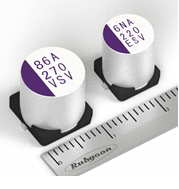【New Product Release】 Hybrid Polymer Capacitors 135℃, High Ripple Current, Chip Type - PSV Series
January 10, 2019
1. Introduction
Rubycon has developed new hybrid polymer capacitors that do not follow conventional design methods. Normally, a hybrid capacitor is a mix of polymer and electrolyte. The key disadvantage of a wet type electrolyte is temperature stability and evaporation of electrolyte over time. Our approach is different, we instead use a proprietary functional gel (ARSII™) in combination with polymer materials to provide the benefit of temperature stability, longer life and higher overall performance.
This is ideal for high frequency circuits demanding extreme ripple current performance such as those found in automotive powertrain applications. Understanding the true performance of our capacitors in conjunction with your mission profile will help to optimize and lower the overall cost of your design.
In recent years, the density of components has increased for automotive under hood and other locations within the vehicle. This has caused a premium for capacitors that can handle additional heat and current in smaller packaging. The demands for fuel efficiency and stable performance are only increasing with time. The trend to employ hybrid polymer technologies are necessary to accomplish such requirements. This is the reason why we have developed our new PSV series which you will find as an extremely reliable and low overall cost solution to your next generation designs.
2. Features
As mentioned above, one of the key features of our hybrid technology is the functional gel employed. Most electrolyte formulations have a tendency to change from a liquid to a solid state at low temperatures which causes the ESR to increase exponentially. In our case, the materials do not have the same freezing condition which allows for a much more stable ESR from high to low temperature. Instead of designing for this worst case (start up) condition your designers can use capacitors that are optimized under all conditions.
The second feature is the dry up speed of our technology. As with other wet type electrolytes, the rate of diffusion through the rubber seal is a function of the temperature employed. As electrolyte escapes from conventional hybrids, the ESR of such capacitors increase proportionally over time. In our case, our functional gel has a much slower rate of evaporation.
What is truly unique about our hybrid capacitors is the fact that there is very little change in ESR over time. Modest change in capacitance is the only variance over time until the capacitor reaches a safe end of life mode. Other capacitor technologies such as ceramic and tantalum have short circuit risk which is not present in our hybrid technologies.
Another advantage of our hybrid capacitors is our durability for capacitors that operate across a 12V battery line of the vehicle. In the past, designs have employed 35v capacitor technology in order to satisfy the extreme conditions of a load dump. In our case, we can easily satisfy 1000 cycle load dump testing at high temperature using 25V (smaller) hybrid capacitors. This also leads to downsizing, additional vibration durability, cost and fuel efficiency savings. The same capacitors are also extremely robust against reverse battery situations which would be difficult to accomplish with conventional (electrolyte based) hybrids.
Another feature of our hybrid technology is how it compares against solid polymer capacitors. Higher capacitance is achieved with hybrid polymers and also a lower leakage current response is attained – this leads to less battery drain. Rubycon PHV series feature 25 to 63V designs with a base guarantee of 135℃. We also offer an even higher PLV series designed to thrive in ambient conditions as high at 150℃.
All of our hybrids are optimized to handle high humidity environmental testing (85℃/85% RH).
A final note on some of the unique characteristics of our hybrid technology → please verify with each manufacture the actual performance characteristics vs. life. It is also important to verify if Arrhenius (doubling of life every 10℃) can be employed. In our case, the answer is yes.
| Main Specifications | |
|---|---|
| Category temperature range | -55℃ ~ +135℃ |
| Rated voltage | 25V ~ 63V |
| Capacitance | 33µF ~ 330µF |
| Sizes | 8×10.5, 10×10.5 |
| Endurance | 135℃ 3,000hours |
| Over Temperature Proof | 150℃ 300hours |
| Humidity Resistance | 85℃85%RH 2,000hours |
| Comparison vs. Conventional Products | |||
|---|---|---|---|
| Value | PSV Series Hybrid Polymer |
THV Series Electrolytic |
|
| Category Temperature Range | -55℃ ~ 135℃ | -40℃ ~ 125℃ | |
| Rated Voltage – Capacitance | 35V 270µF | 35V 220µF | |
| Size(ΦD×L mm) | 10×10.5 | 10×10.5 | |
| Rated Ripple Current A rms, 100kHz |
135℃ 125℃ |
3.0 3.9 |
N/A 0.5 |
| ESR | 20℃, 100kHz | 16mΩ | 200mΩ |
| -40℃, 100kHz | 13mΩ | 3,000mΩ | |

Samples: Available Now Mass Production : April, 2019

